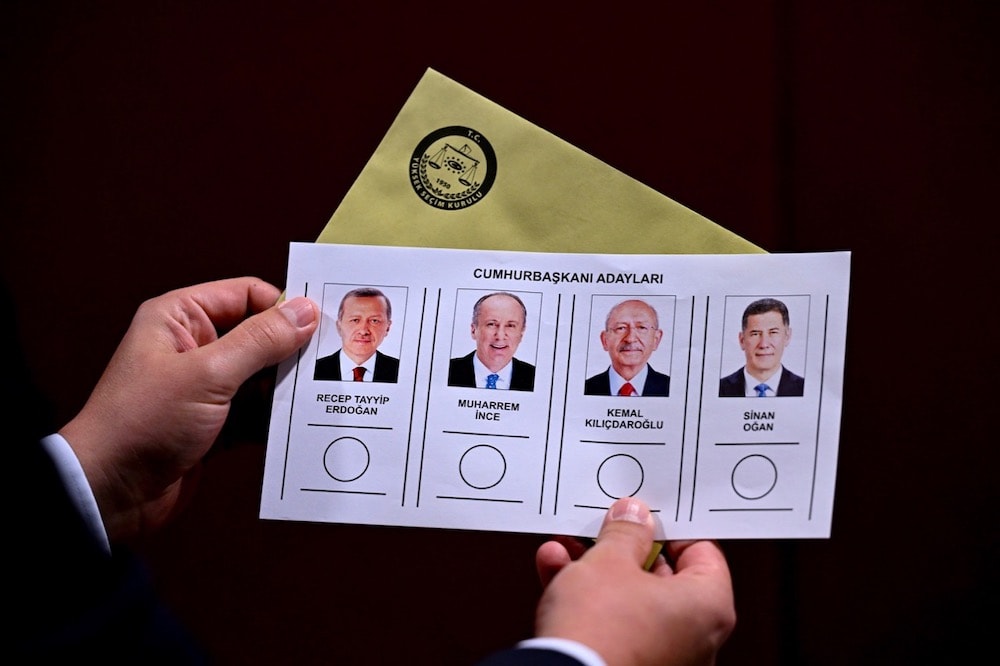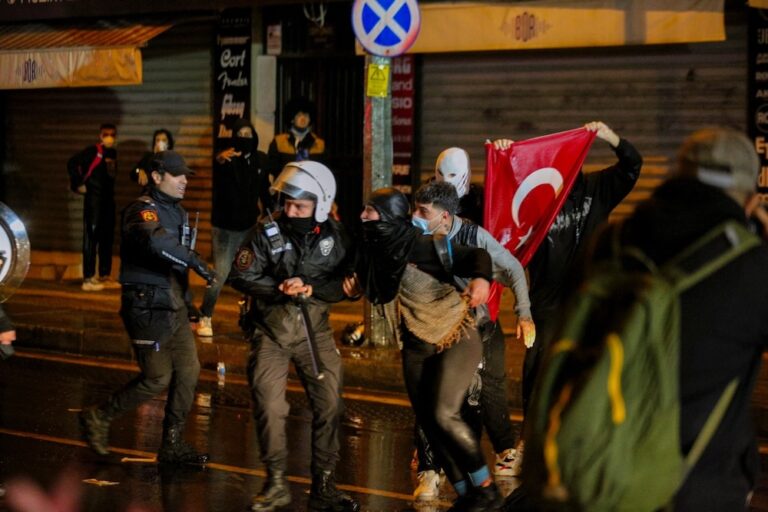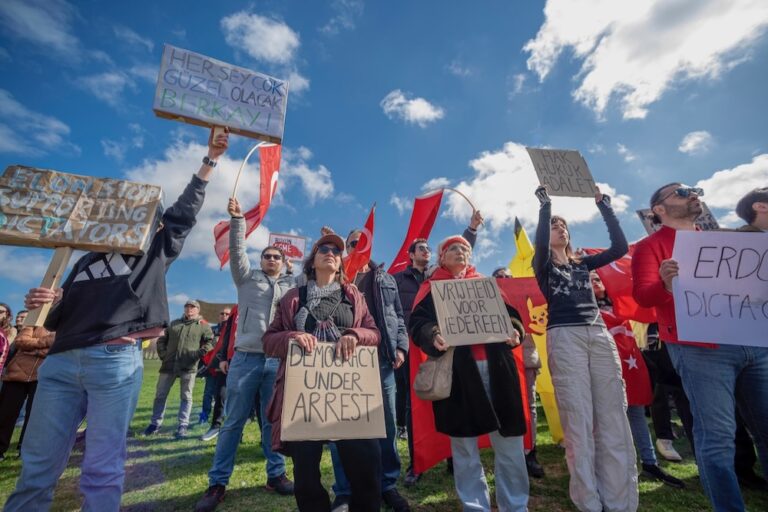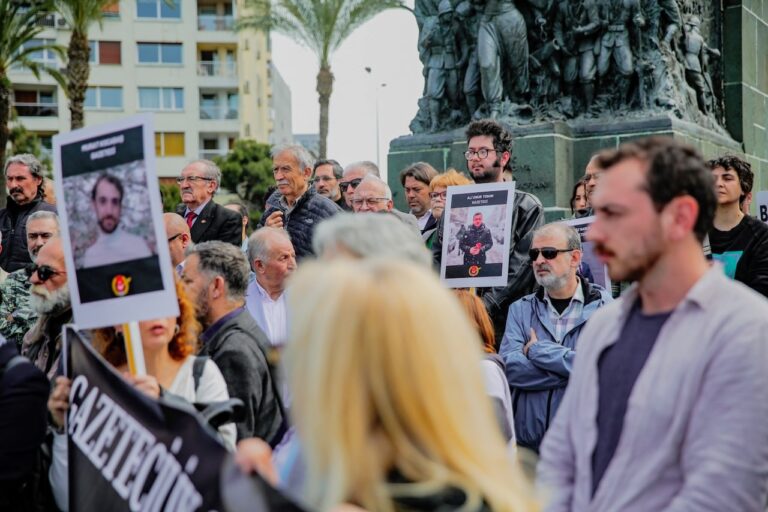Ahead of the elections, Expression Interrupted analyses the approaches to media regulation and free speech of the two leading candidates: Recep Tayyip Erdoğan and Kemal Kılıçdaroğlu.
This statement was originally published on expressioninterrupted.com on 9 May 2023.
Turkey will vote on 14 May to elect its 13th president and the 600 members of the 28th Parliament. The question of who will govern Turkey, which will celebrate the centenary of the Republic this year, for the next five years and perhaps beyond will then be answered.
The public and the media frequently refer to the elections of 14 May, which will take place on the brink of the second century of the Republic and focus on the choice between the presidential system and the parliamentary system, as “critical.” It is clear that 14 May (or if the presidential election goes to a second round, 28 May) will be a sharp turning point. Will Turkey make a switch and enter the path of democracy, or will it continue to drift even more violently?
Although there are four candidates for president in the race that will shape Turkey’s future, there are two basic approaches and therefore the elections will be contested by two candidates: The People’s Alliance (Cumhur İttifakı in Turkish) candidate Recep Tayyip Erdoğan and the Nation Alliance (Millet İttifakı) candidate Kemal Kılıçdaroğlu.
So what does the choice between Erdoğan and Kılıçdaroğlu mean for the future of freedom of expression and the media sector? What have the rival alliances promised in this field?
The Justice and Development Party (AKP), which is the larger partner in the People’s Alliance that has united around Erdoğan’s candidacy, came to power in the early 2000s with strong promises. The 2002 Electoral Manifesto of the AKP, which devoted a large section to the freedom of thought and expression stated “The prohibitive clauses in the legislation make Turkey appear as a state of laws rather than a state governed by the rule of law. Turkey will have the rule of law in the true sense and earn a respected place in the international community by basing its laws and its judicial system on the principles of universal justice and human rights and changing its prohibitive system of law which limits the enjoyment of fundamental rights and freedoms.”
However, in subsequent years and especially following the coup attempt in 2016, after which it officially partnered with the Nationalist Movement Party (MHP), the AKP gradually adopted a more authoritarian approach to government. The support lent by the MHP, led by Devlet Bahçeli, to a wearied Erdoğan’s transition to the presidential system led to an exacerbation of the repressive policies of the government. As pressure on journalists mounted, critical reporting and commentary were equated with “enmity to the state and the nation.” With the government’s control over the judiciary gradually increasing, journalists were targeted with accusations of being “terrorist” or “spies” and faced investigations and trials on related charges. Finally, with the law claimed to have been made to “combat disinformation” the media space was even further narrowed in the run up to the elections.
The AKP has increased control of the media for “cultural power”
For Erdoğan, being in power goes beyond controlling the government and involves acquiring control in the cultural and social fields as well. Erdoğan clearly indicated this perspective when he once said “It is one thing to be in power politically. It is something else to be in power socially and culturally. However, we are still experiencing problems with our social and cultural government.”
The AKP, which defined its relationship with the internet in development and economic growth terms during its first years in power, used to praise the internet technologies for modernizing, advancing, globalizing and digitalizing Turkey. However, its discomfort at criticism of the AKP on social media led the AKP leadership in later years to bring social media, as well as the conventional media, under control through a series of legislation. Having established a monopoly over the media in its many years in government, the AKP is still making attempts to impose a similar single voice over the internet and the social media.
Erdoğan is currently preparing for the elections on 14 May with a one-of-its-kind coalition that includes, in addition to the MHP, the Great Unity Party (BBP), the Democratic Left Party (DSP) and the Free Cause Party (HÜDA PAR) which has become synonymous with the Hezbollah terrorist organization. On the eve of the elections, the AKP government continues its policies of recent years to increase pressure on “opposition media” through punitive measures imposed by the Directorate of Communications of the Presidency and the Presidency’s Communication Center (CİMER), as well as the Press Advertising Agency (BİK) and the Supreme Board of Radio and Television (RTÜK).
Targets: “Pluralism” in the media and “the protection of the family” on social media
So, what does the government’s alliance promise for the media after 14 May? In the AKP’s 486-page long “2023 Electoral Manifesto for the Century of Türkiye” document announced for 14 May, the 20-plus years of AKP government is described as a process that saw “a struggle with all focuses of political tutelage that cut off the breath of the people in the media.” The electoral manifesto states, “In line with the understanding of political pluralism, we have lifted the obstacles to the media acquiring a pluralistic structure as an institution that provides correct information and checks. We have viewed media independence as an essential requirement for an active and transparent civil society and took steps to structure a multi-directional as opposed to uni-directional media with a transparency and competitiveness perspective.”
The AKP, which just a few months ago collaborated with the MHP to add the crime of “publicly distributing false information” to the Turkish Penal Code, claims to have expanded press freedom in its electoral manifesto. The manifesto further states: “In 2004, we added the provision that printers’ workshops and their annexes and printing tools could under no circumstances be confiscated or sequestered as criminal tools or be forbidden from operating. We strengthened press freedom with amendments to the Law on the Press. We narrowed the scope of press crimes. We introduced a condition of passage of time for filing court cases against crimes committed through the press and broadcasting.”
While the manifesto praises the moves based on preventing “disinformation,” “family values” appear as the new pretext for the AKP’s moves to control the media and social media in the coming period.
The manifesto states, “We continue our work to cooperate with stakeholders on the protection of family values through the establishment of family friendly media. We will encourage the production of artistic content that is compliant with family values and its presentation in the framework of necessary ethical rules in the fields of culture, arts and the media. We will undertake work in consultation with media and social media parties to combat content that could negatively affect our children and families.”
Nation Alliance: We will strengthen freedom of the press
The Nation Alliance, which consists of the main opposition Republican People’s Party (CHP), İYİ Party, Saadet Party, Democrat Party, DEVA Party and the Future Party listed its pledges to the electorate with the “Joint Policies Consensus Document” it announced on 30 January 2023. The document states that rapid legislative changes would be carried out as good will moves on the freedom of the press which have been eroded by the AKP.
Interestingly, the document resembles the original promises of the AKP and states “We will strengthen the freedom of the press. We will clearly regulate the State’s responsibility to take the necessary measures for the free formation of public opinion and the media gaining a pluralist structure” in opposition to the AKP government.
Vice Chairperson Mustafa Yeneroğluof the DEVA Party who oversaw the drafting of the Joint Policies Document on behalf of his party spoke to Expression Interrupted about the steps to be taken if the Nation Alliance comes to power and said: “The current outlook on the situation of the freedom of expression and of the press is very concerning. As the Nation Alliance, our priority will be to carry out legal and structural reforms right after the elections to end the limitations to the freedom of expression and of the press and to re-ensure the people’s right to be informed and to learn the truth. We will begin by amending the legislation that disproportionately limits the freedom of expression and of the press and will put an end to all forms of pressure on these freedoms.”
Yeneroğlu continued by saying that subsequently the focus would be on detailed legislative work and stated, “I think that we will remove the crime of insulting the president from the penal code based on the European Court of Human Rights judgments and will regulate the crime of insulting the president as with all other crimes of insult. I am also sure that we will carry out work on the ‘disinformation’ law and the crime of publicly distributing information that is misleading to the public. We will also revise the internet regulation to bring it in line with international standards so that it does not limit the freedom of expression or violates personal rights.”
Yeneroğlu added that they attached special importance to transparency in the ownership and financing of the media and referred to the pledges in the Joint Policies Documents before saying “For this reason, we will take measures to prevent monopolies and cartels in the media post haste. We will carry out legal and structural changes to ensure that RTÜK, which has become the government’s media censorship agency, carries out its duties independently and impartially and we will ensure pluralism in the membership of the board. Similarly, we will restructure the [public broadcaster] TRT and [state-run] Anadolu Agency, which currently work as though they are the press offices of the government, in line with the principles of independence and impartiality. We will speed up legal and structural changes so that the Press Advertising Agency can carry out its duties independently and impartially. We will end arbitrary press accreditation decisions and ensure that journalists’ organizations can decide on issuing press cards and admittance to the profession.”
Tuncay Özkan, chief advisor to the CHP Chairperson on the media and institutional communication, pointed out the influence of internet media and social media and summarized what the CHP and the Nation Alliance would do in this field as follows:
“We will amend the Law 5651 on the Regulation of Online Publications and Combating Crimes Committed through Such Publications to protect the freedom of expression and personal privacy, in line with universal, pluralist and democratic principles and with wide-ranging consultation. We will revise the rights and obligations of social media platforms and cancel censorship provisions. We will add digital literacy and media literacy subjects to school curriculums that are integrated with other subjects and/or as stand-alone subjects. We will protect an environment of freedom of internet media and social media, support internet media and social media reporting and develop measures against insults and defamation on social media. We will ensure that internet media and social media income is included in the taxation system through service providers, advertisers or sponsors and without impacting content producers. We will regulate advertising and similar activities regarding digital assets, make such activities transparent and prevent the cheating of citizens using social media.”
“Judicial independence is the primary problem”
According to Mustafa Yeneroğlu, who himself is a jurist, Turkey first needs to solve its problem of judicial independence in order to secure a “free media” or to solve its other problems with fundamental rights, economic welfare, peace, equality and security. Yeneroğlu said “As we know, under a system that does not guarantee judicial independence, it becomes impossible to ensure fundamental rights, a free media, academic freedom, economic welfare, peace, equality and security.”
Taking the Joint Policies Consensus Document as a benchmark, it seems that the Nation Alliance’s pledges for the media, social media and the journalistic profession matches society’s expectations in this field. However, even if the government changes after 14 May, it will not be easy for Turkey to reverse the erosion to democratic gains under the AKP government in short order.
What can the media expect after the elections?
Even if the Nation Alliance were to win the elections, the media will still be obliged to speak truth to power. If the Nation Alliance and its candidate for president Kemal Kılıçdaroğlu stay true to their promises to the public, the media might have an easier time undertaking this duty.
The answer to the question what awaits Turkey should the AKP win the elections may well be sought in the pages of 1984 by George Orwell.
Although promises of “advanced democratic” government for Turkey may be delivered at a “balcony speech” on the evening of 14 May, we may very well see operations to capture those insisting on practicing journalism to attain the target of “cultural power.”



